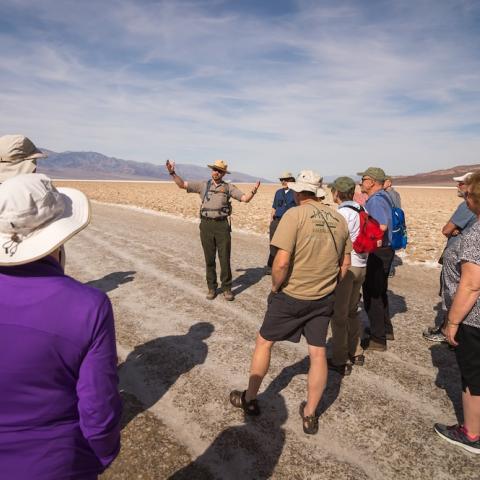
Wild burros at Death Valley National Park are going to be rounded up and moved out of the park/NPS
Burros from Death Valley National Park are heading towards sanctuaries and adoptive homes thanks to a major project made possible by the nonprofit Peaceful Valley Donkey Rescue. This project takes care of individual burros, allows native habitats to recover, and is funded entirely by donations.
Burros and donkeys are the same species. “Burro” is the term commonly used for wild animals and “donkey” usually refers to domesticated animals. Death Valley’s burros are descended from domestic animals released into the wild. Many were released by mining prospectors, and today many people see burros as a part of Western heritage.
“The National Park Service’s goal is not have any nonnative burros in Death Valley because they are extremely destructive to fragile desert springs and vegetation. They compete with native animals like desert tortoise and bighorn sheep for resources, and have a devastating impact on the park,” said Death Valley Superintendent Mike Reynolds.
This is different from the management goals of the Bureau of Land Management, which is mandated by Congress to maintain a healthy – but not excessive – population of burros. This means there will continue to be opportunities to see wild burros in areas near Death Valley National Park.
The National Park Service and Peaceful Valley Donkey Rescue have signed a 5-year project agreement to capture and remove up to 2,500 burros from Death Valley National Park. The Death Valley work is part of Peace Valley’s larger Wild Burro Project, which also includes burro relocations from Mojave National Preserve, NASA Goldstone Deep Space Communications, Fort Irwin National Training Center, and China Lake Naval Weapons Center.
Mark Meyers, executive director of Peaceful Valley Donkey Rescue, said, “Our main objective is to protect our wild burros. If they must be removed, we want to ensure that it is done safely with as little stress possible."
Peaceful Valley Donkey Rescue is a nonprofit organization and is not charging federal agencies for this work. Information about their projects, adopting burros, sponsoring burros in sanctuaries, and donations is available at donkeyrescue.org. Peaceful Valley has already rescued over 10,000 burros nationwide.
Peaceful Valley, which started the roundup this week, plans to use methods that cause minimal stress to the animals. They will trap burros in temporary corrals with one-way gates. The corrals will be set up around springs and baited with hay. If the traps are not effective, wranglers on horseback or helicopters could be used to help capture the burros.
Peaceful Valley will move the burros to a corral within the park before transferring them to training facilities. The burros will be tested for disease, neutered, and trained to be comfortable around human beings. Burros that remain wild in nature will be kept at sanctuaries, but donkeys that enjoy humans will be put up for adoption.
Peaceful Valley evaluates suitability of potential adoptive homes. Burros cannot not be resold or transferred; they remain the property of Peaceful Valley Donkey Rescue once adopted out. As an added assurance, each burro is branded “PV.”
Death Valley National Park has not removed burros since 2005, largely due to funding issues and lack of capacity in federal burro adoption centers. Burro populations have increased greatly in recent years, and are estimated to be between 2,000 and 4,000 animals currently. The cost of caring for burros in the federal facilities averages $1,800 per animal per year.
“This is a win-win-win. The burros will be healthy and taken care of, either in sanctuaries or in adoptive homes," said Superintendent Reynolds. "The natural resources in the park can recover. And private donors, not taxpayers, are covering most of the cost.”
Burro roundups in Death Valley National Park will continue intermittently for up to five years under the current agreement between the National Park Service and Peaceful Valley Donkey Rescue.




 Support Essential Coverage of Essential Places
Support Essential Coverage of Essential Places






